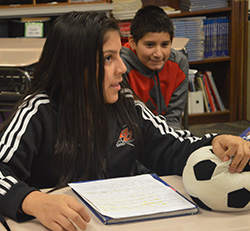Though the topic was tied to the American Revolution, discussion among Wyoming Intermediate School fifth-graders was inspired by a robed man with a long beard who did his musing more than two millennia ago: Socrates.
The young philosophers joined the Socratic Seminar discussion panels – desks pushed together into large rectangles –– for deep thinking about a long-debated question: “Who was responsible for inciting the Boston Massacre?”
Taunting colonists, trigger-happy British soldiers, events leading up to the massacre and how it all went down — students talked about such details in teachers Paul Debri and Wendy Kiel’s class. They drew conclusions about who was responsible for the March 5, 1770 event when five colonial residents were shot and killed by British soldiers.

“The colonists were fearing the soldiers, so maybe (the soldiers) could fire to start a fight,” said student Emma Parm.
“Colonists were kind of guilty because the mobs were taunting and teasing the British soldiers,” chipped in Regan Mead.
Socratic Seminars, used in several Wyoming Intermediate classrooms, employ the Socratic method, a form of dialogue based on asking and answering questions to stimulate critical thinking, and to draw out ideas and underlying presumptions.
Socrates, born circa 470 B.C., was known for questioning others, listening to what they had to say and probing for contradictions.
“Socrates wasn’t wanting one true answer,” said teacher Debri. “He had open-ended questions that could be debated, discussed and shared. … It was the whole process of questioning, thinking and rationalizing.
“This is a great way for students to discuss things in a polite way, ask questions, reason, justify answers,” he added. “It’s a great way for them to express their thoughts in a nice, safe environment.”

A Method of Questioning and Listening
Socratic Seminars, which work for nearly all subjects, take off with little teacher moderation. Students come prepared with questions, make points and counterpoints, speak only when they are holding aball, and agree or disagree based on research they’ve done in class.
They start statements with, “I agree because …” or “I disagree because …” or I have a question …” and often end with “What do you think?,” prompting more dialogue as they pass the ball to a classmate.
Language arts department chair and sixth-grade teacher Jayne Bartrand introduced the seminars to staff members last school year. It requires skills used by “the great brains of time,” she said. Teachers tested it, debating the killing of Cecil the Lion in Zimbabwe by an American hunter.
“It addresses so many skills we want kids to have,” Bartrand said. “That’s how we should all function in a workplace really. You sit down, here’s an idea and you discuss it.”
Students offer each other checks and balances, pointing out other perspectives and more information. “They really do have to support their line of thinking,” Bartrand said.
Debri said students use key vocabulary and make intersections between other historical events during the seminars, taking active control of their learning.

Thinking Like a Greek
Students said acting like Socrates helps them have an open mind and look at issues and events from different angles. Fifth-graders have also had a seminar on Cecil the Lion. Sixth-graders have discussed stories of courage based on readings; the positives and negatives of being a YouTube star; and what happened to Amelia Earhart.
“I’ve learned everybody has an opinion on things and our opinions are not all going to be the same,” said fifth-grader Yeriel Francis. “You are learning more and more from what other people think.”
“I like it because there’s one person speaking at a time and there’s many different opinions going around,” added Emma Parm. “It helps me personally with understanding what the whole thing is about and what happened if I’m not clear about it.”
Fifth-grader Haley Young said the talks help her learn more than she would in a traditional classroom lesson. She’s also getting more comfortable with public speaking.
Gage Behrenbrinker agreed. “Like Haley said, if you just watch a video and read an article you don’t learn much, but if you really talk about it with other people you start to learn more and you want to get more involved.”
CONNECT
Socratic Seminars









